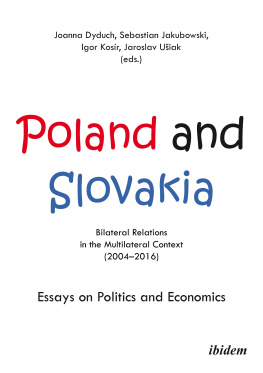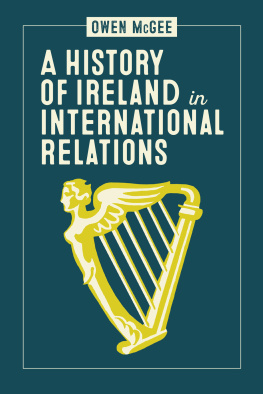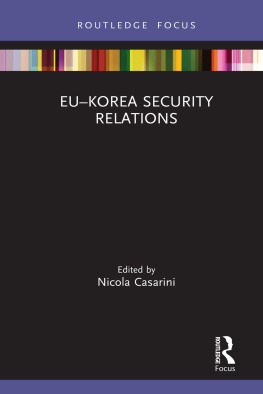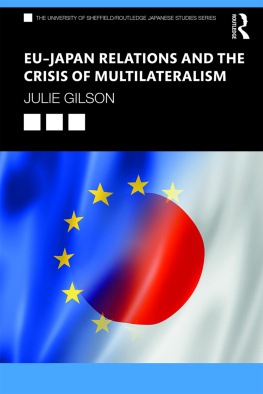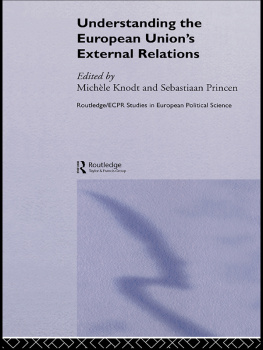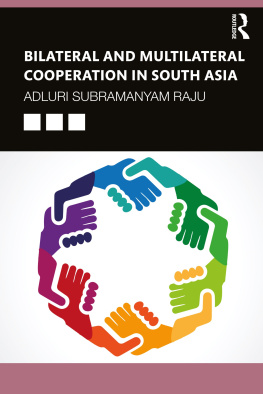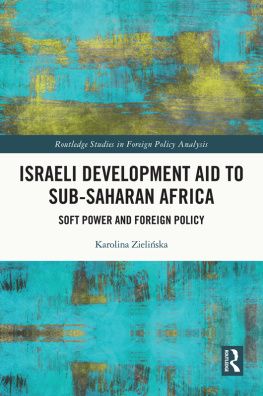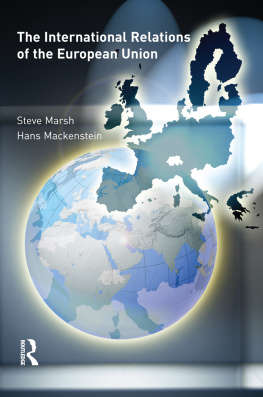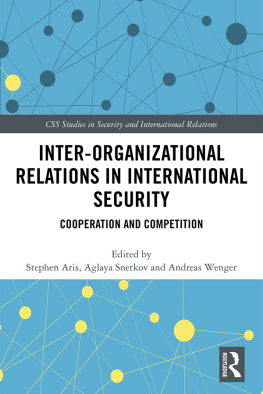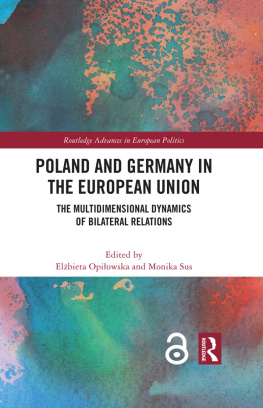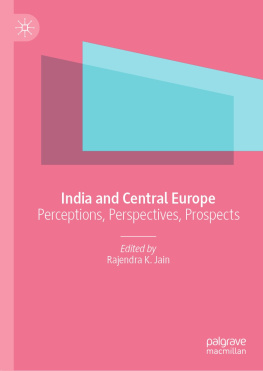ibidem Press, Stuttgart
This book has resulted from the projects supported by the Faculty of Social Sciences at the University of Wrocaw, the Faculty of Political Science and International Relations at Matej Bel University and the International Visegrad Fund.
Table of Contents
List of abbreviations
Agency for the Cooperation of Energy Regulators (ACER)
Association of European Border Regions (AEBR)
Bologna Follow-up Group (BFUG)
Carpathian Euroregion (CER)
Central European Free Trade Agreement (CEFTA)
Central European Initiative (CEI)
Common Agricultural Policy (CAP)
Common Foreign and Security Policy (CFSP)
Common Security and Defence Policy (CSDP)
Council for Mutual Economic Assistance (CMEA)
Cross-Border Operation (CBO)
Deep and Comprehensive Free Trade Agreement (DCFTA)
Digital Single Market (DSM)
Eastern Partnership (EaP)
Economic and Monetary Union (EMU)
European Association of Development Agencies (EURADA)
European Commission (EC)
European Endowment for Democracy (EEfD)
European Free Trade Association (EFTA)
European Grouping of Territorial Cooperation (EGTC)
European Higher Education Area (EHEA)
European Neighborhood Policy (ENP)
European Security and Defence Policy (ESDP)
European Union (EU)
European Union Force in Bosnia and Herzegovina (EUFOR)
European University Association (EUA)
Foreign Direct Investment (FDI)
International Security Assistance Force (ISAF)
International Monetary Fund (IMF)
International Visegrad Fund (IVF)
Liquified Natural Gas (LNG)
NATO Response Force (NRF)
North Atlantic Treaty Organization (NATO)
Organization for Economic Cooperation and Development (OECD)
Organization for Security and Co-operation in Europe (OSCE)
Office for Democratic Institutions and Human Rights (ODHIR)
Purchasing Power Standards (PPS)
Polish Press Agency (pol. Polska Agencja Prasowa) (PAP)
Polish Central Statistical Office (pol. Gwny Urzd Statystyczny) (GUS)
Trans-European Energy Network (TEN-E)
Trans-European Transport Network (TEN-T)
Treaty on the European Union (TEU)
Treaty on the Functioning of the European Union (TFEU)
World Economic Forum (WEF)
Visegrad Group (V4)
United Nations (UN)
Notes on contributors
Dr. Joanna DyduchAssistant Professor at the Department of European Studies at the University of Wrocaw (Poland). Author of several scientific articles devoted to foreign policy analysis and energy policy. Author, editor and co-editor of books (e.g. Selected Policies of the European Union. Evolution in the context of the Lisbon Treaty and the Europe 2020 Strategy, Publishing House: ASPRA, Warszawa 2012; European Union Development. Challenges and Strategies, Publishing House: ASPRA, Warszawa 2013; European Union as a Global Actor. Political integration: identity issues and foreign policy, Publishing House: ASPRA, Warszawa 2014). Member of the Executive Committee of the European Association of Israel Studies at the School of Oriental and African Studies / University of London. Visiting scholar at various universities (e.g. SOAS University of London; Ben Gurion University of Negev Beer Sheva, Israel; Universidad CEU Cardenal Herrera in Valencia, Spain; Matej Bel University in Bansk Bystrica, Slovak Republic).
Prof. Igor KosrProfessor at the Department of International Relations and Diplomacy at the Matej Bel University in Bansk Bystrica (Slovakia), responsible for the Universitys international cooperation as its Vice Rector (2010-2014). Author of several scientific articles devoted to world economy development, international economic integration and the European Unions external relations. Author, editor and co-editor of books (e.g. Foreign Trade Policy of European Union, Publishing House: Ekonm, Bratislava 2007; International Economic Integration: from Autarky to Global Economic Integration, Publishing House: MBU, Bansk Bystrica 2010; European Perspectives of Western Balkans countries, Publishing House: ABB, Prishtina 2015; Alternatives of European Integration Development, Publishing House: Ekonm, Bratislava 2015). Visiting scholar at various universities (e.g. University of Reims Champagne-Ardenne in Reims, France; University of Sarajevo, Bosnia and Herzegovina; University of Batumi, Georgia).
Dr. Sebastian Jakubowski is a graduate of the University of Wrocaw (Faculty of Law, Administration and Economics). Since 2005 he has been working at the Universitys Institute of Economic Sciences. Today he holds the position of an Assistant Professor. His research interests are focused on economic policy and structural changes that shaped Central and Eastern Europe after the collapse of communism. Dr Sebastian Jakubowski is also an organizer of a biannual International Wroclaw Symposiums of Economic Policy. His academic career is filled with numerous visits to foreign universities, such as the University of California (Santa Barbara, US), Leipzig University, the University of Latvia, the Vilnius Gediminas Technical University, the iauliai University, as well as the Fraunhofer MOEZ Institute in Leipzig.
Doc. Mgr. Jaroslav Uiak, PhD Associate Professor at the Faculty of Political Sciences and International Relations, Matej Bel University in Bansk Bystrica (Slovak republic) and, since 2013, Editor-in-Chief of a scientific journal Politick vedy ( Political Sciences ) devoted to political sciences, international relations, modern history and security studies. He is an author and co-author of several books: Bezpenos ako kategria ( Security as a category ); Security Policy of the Slovak RepublicDevelopment, Cornerstone and Implications . He has authored several articles devoted to international relations and security studies, focusing on regional security, mainly in Central Europe. He is a member of the Editorial Board of several scientific journals: Souasn Evropa and Defense and Strategy . He has undertaken many research and lecture stays and participated in various conferences, both in his native Slovakia and a number of other countries, such as the Czech Republic, Poland, Hungary, Belgium, Slovenia, France, Ukraine and others.
Joanna Dyduch
Chapter one
Analyzing the bilateral relations between
the European Union member states
Introduction
Despite their geographical closeness and similar socio-political experiences in the past, it seems that Poles and Slovaks know little about each other. Similarly, Polish-Slovak relations are, at best, only moderately dynamic given how many areas offer the two governments good opportunities for intensive cooperation. The existing, fairly narrow literature on Polish-Slovak bilateral relations characterizes them as good and friendly, but it is often noted that the potential for their further development is not being utilized. This is so for several reasons. First of all, priorities of national foreign policies basically put the relations between the two countries in the multilateral context (European Union, NATO, Visegrad Group). Secondly, the development of contacts is hindered by problems such as an unsatisfactory transport infrastructure (especially on the Polish side). Thirdly, compared to the importance attributed to ties with other neighbors, the topic of Polish-Slovak relations is almost absent from the socio-political discourse held in both countries. Moreover, unlike in the case of Polish-Russian or Slovak-Hungarian relations, the last two decades have not seen any controversial issues that would dictate the tone of conversation between Warsaw and Bratislava. Further still, not once has the narrative referring to common history been used for political purposes. All this results in a paradoxical situation where the ties between Poland and Slovakia are almost entirely overlooked not only by the media, but also by the academia. For Poles, Slovakia and its inhabitants remain relatively unknown neighbors.

